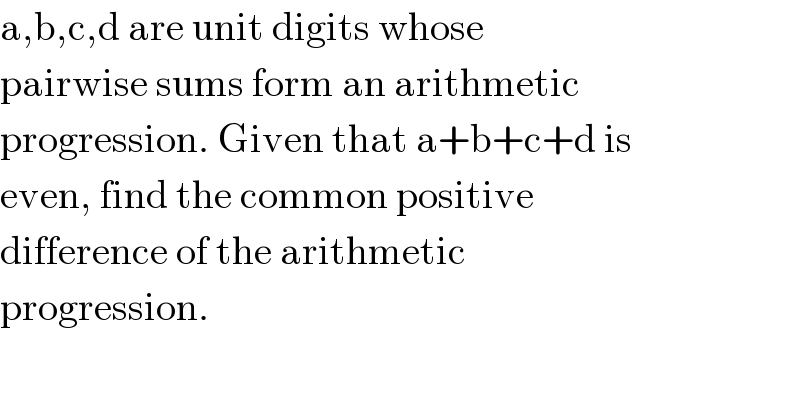
Question Number 110715 by Aina Samuel Temidayo last updated on 30/Aug/20

$$\mathrm{a},\mathrm{b},\mathrm{c},\mathrm{d}\:\mathrm{are}\:\mathrm{unit}\:\mathrm{digits}\:\mathrm{whose} \\ $$$$\mathrm{pairwise}\:\mathrm{sums}\:\mathrm{form}\:\mathrm{an}\:\mathrm{arithmetic} \\ $$$$\mathrm{progression}.\:\mathrm{Given}\:\mathrm{that}\:\mathrm{a}+\mathrm{b}+\mathrm{c}+\mathrm{d}\:\mathrm{is} \\ $$$$\mathrm{even},\:\mathrm{find}\:\mathrm{the}\:\mathrm{common}\:\mathrm{positive} \\ $$$$\mathrm{difference}\:\mathrm{of}\:\mathrm{the}\:\mathrm{arithmetic} \\ $$$$\mathrm{progression}. \\ $$
Commented by Rasheed.Sindhi last updated on 30/Aug/20

$$``\mathrm{pairwise}\:\mathrm{sums}\:\mathrm{of}\:\mathrm{a},\mathrm{b},\mathrm{c},\mathrm{d}'' \\ $$$${All}\:{possible}\:{pairs}?{Order}? \\ $$
Commented by Aina Samuel Temidayo last updated on 30/Aug/20

$$\mathrm{I}\:\mathrm{didn}'\mathrm{t}\:\mathrm{change}\:\mathrm{the}\:\mathrm{question}.\:\mathrm{That}'\mathrm{s} \\ $$$$\mathrm{how}\:\mathrm{it}\:\mathrm{is}. \\ $$
Answered by Rasheed.Sindhi last updated on 30/Aug/20

$${a}+{b},{b}+{c},{c}+{d}\:{are}\:{in}\:{AP} \\ $$$${The}\:{common}\:{difference}: \\ $$$$\left({b}+{c}\right)−\left({a}+{b}\right)=\left({c}+{d}\right)−\left({b}+{c}\right) \\ $$$${c}−{a}={d}−{b} \\ $$$${b}+{c}={a}+{d} \\ $$$$−−−−− \\ $$$$\:\mathrm{1}+\mathrm{3}=\mathrm{0}+\mathrm{4}\:\:\:\:\:\: \\ $$$$\mathrm{0},\mathrm{1},\mathrm{3},\mathrm{4}\:\:\:\:\:\:\: \\ $$$$\mathrm{0}+\mathrm{1},\mathrm{1}+\mathrm{3},\mathrm{3}+\mathrm{4} \\ $$$$\mathrm{1},\mathrm{4},\mathrm{7} \\ $$$$−−−−− \\ $$$$\mathrm{0},\mathrm{2},\mathrm{3},\mathrm{5} \\ $$$$\mathrm{0}+\mathrm{2},\mathrm{2}+\mathrm{3},\mathrm{3}+\mathrm{5} \\ $$$$\mathrm{2},\mathrm{5},\mathrm{8} \\ $$$$−−−−−− \\ $$$$\mathrm{0},\mathrm{2},\mathrm{4},\mathrm{6} \\ $$$$\mathrm{0}+\mathrm{2},\mathrm{2}+\mathrm{4},\mathrm{4}+\mathrm{6} \\ $$$$\mathrm{2},\mathrm{6},\mathrm{10} \\ $$$$−−−−− \\ $$$$\mathrm{1},\mathrm{3},\mathrm{6},\mathrm{8} \\ $$$$\mathrm{1}+\mathrm{3},\mathrm{3}+\mathrm{6},\mathrm{6}+\mathrm{8} \\ $$$$\mathrm{4},\mathrm{9},\mathrm{14} \\ $$$$−−−−−− \\ $$$$\mathrm{1},\mathrm{3},\mathrm{7},\mathrm{9} \\ $$$$\mathrm{4},\mathrm{10},\mathrm{16} \\ $$$$\overset{\frown} {{a},{b},{c},{d}}\:\:\:{a}+{d}={b}+{c} \\ $$$${is}\:{only}\:{codition}\:{for}\:{your} \\ $$$${question},{if}\:{I}\:{undestand}\:{the} \\ $$$${question}. \\ $$$${a}+{d}={b}+{c} \\ $$$$\:_{\:\:\:\:{a}+{d}\in\mathbb{E}\Rightarrow{b}+{c}\in\mathbb{E}\Rightarrow{a}+{b}+{c}+{d}\in\mathbb{E}} ^{\bullet{a}+{d}\in\mathbb{O}\Rightarrow{b}+{c}\in\mathbb{O}\Rightarrow{a}+{b}+{c}+{d}\in\mathbb{E}} \\ $$$$\:\:\:\:{a}+{b}+{c}+{d}\in\mathbb{E} \\ $$$$−−−−−−− \\ $$$$\:^{\bullet} {d}={b}+{c}−{a} \\ $$$$\:\:{a},{b},{c},{b}+{c}−{a} \\ $$$$\:\:\:{b}−{a}={b}+{c}−{a}−{c} \\ $$$$\:\:\:{b}−{a}={b}−{a} \\ $$$$\:\:\:\therefore\:{a}+{b}\:,\:{b}+{c}\:,\:{c}+{d}\:{is}\:{an}\:{AP} \\ $$$${Generally}\:{common}\:{difference} \\ $$$$\:{is}\:{c}−{a}\:\:\:{or}\:\:{d}−{b}.{For}\:{making} \\ $$$${it}\:{positive}\:{we}\:{will}\:{take}\:{c}>{a}\:{and} \\ $$$${d}>{b} \\ $$
Commented by Aina Samuel Temidayo last updated on 30/Aug/20

$$\mathrm{So}\:\mathrm{what}\:\mathrm{is}\:\mathrm{the}\:\mathrm{common}\:\mathrm{difference}? \\ $$
Commented by Rasheed.Sindhi last updated on 30/Aug/20

$${Common}\:{difference}\:{is}\:{not}\:{same} \\ $$$${for}\:{all}\:{solutions}.{Please}\:{read}\:{last} \\ $$$${lines}\:{in}\:{red}\:{color}\:{of}\:{my}\:{solution}. \\ $$
Commented by Aina Samuel Temidayo last updated on 30/Aug/20

$$\mathrm{With}\:\mathrm{the}\:\mathrm{options}\:\mathrm{I}\:\mathrm{have}\:\mathrm{here},\:\mathrm{the} \\ $$$$\mathrm{common}\:\mathrm{difference}\:\mathrm{is}\:\mathrm{only}\:\mathrm{one}. \\ $$
